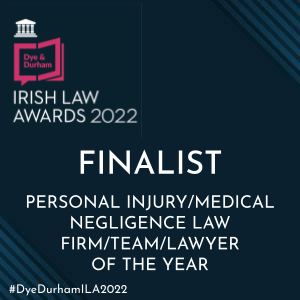INSTRUCTING A SOLICITOR FOR A CRIMINAL INJURY* COMPENSATION CLAIM
At McMahon Goldrick Solicitors, we have many years of experience dealing with Criminal Injuries* Compensation Claims. This includes bringing cases for criminal assault compensation before the Criminal Injuries Compensation Tribunal.
We have assisted clients who have sustained brain injuries, spinal injuries, limb amputation and severe burn injuries. These injuries have arose from arson attacks in their applications to the Criminal Injuries Compensation Tribunal.
CRIMINAL INJURIES* COMPENSATION TRIBUNAL
The Criminal Injuries* Compensation Tribunal (CICT) is a state body that was set up to provide compensation to injured victims of violent assaults.
The injured victim can make an application to the Tribunal to receive compensation. Typically, when a victim has sustained serious injuries it is advisable to engage the services of a solicitor. The solicitor will then make the application on their behalf.
The Tribunal will firstly assess the application. Then, it will be determined as to whether the injured victim is eligible for compensation under the Scheme of Compensation for Personal Injuries Criminally Inflicted.
There is no requirement for the assailant to have been arrested or detained by the Gardaí.
WHO CAN APPLY FOR COMPENSATION?
- A person injured as a direct result of violent crime.
- A person who was injured while assisting/trying to assist in preventing a crime or saving a human life.
- A person responsible for looking after a victim of a crime, who is out-of-pocket as a result of the victim’s injuries.
- The immediate family of an injured victim of a crime who has died.
WHAT COMPENSATION IS AWARDED?
- Out-of-pocket expenses and bills, including medical expenses.
- Loss of earnings.
- Estimated future loss of earnings.
- Estimated future medical expenses.
- Estimated future expenses as a result of the disability (e.g. future care or special equipment).
The Scheme does not compensate for pain and suffering (except for prison officers who are the victims of an assault suffered in the course of their duties).
In the event of the death of a family member, the victim’s family will be paid the actual loss of earnings and expenses that may have been incurred before the death, future loss of support or maintenance for the victim’s dependents, funeral and burial expenses and mental distress money for immediate family members.
CONSIDERATIONS IN DETERMINING HOW MUCH COMPENSATION SHOULD BE AWARDED
The Tribunal will consider all income the applicant received since the injury occurred (including social welfare payments, salary, and wages).
Additionally, the tribunal will take into account any compensation paid on behalf of the assailant.
Moreover, the tribunal may reduce the amount of compensation or give no compensation at all, if it decides that the injured party was wholly or partly to blame for the incident (e.g. if the injured party provoked the incident).
TIME LIMIT
The incident in which the injury was caused must be reported to the Gardaí without delay.
The current time limit for making a claim to the Tribunal is within three months from the date of the incident. However, the Tribunal may exercise their discretion and extend the time limit if a reasonable explanation for the delay can be given. Though, where possible, it is preferable to apply as soon as possible following the incident as the Tribunal may refuse to make such an extension.
HOW TO BRING A CLAIM
Read more to see the steps that are involved in bringing a claim to the Criminal Injuries Compensation Tribunal.
Very generally, a CICT claim can take approximately 3 years to process. However, this can be dependent on the complexity of the injury itself and the nature of how it arose. Furthermore, it can depend on the Tribunal’s waitlist for hearings.



